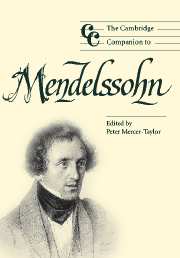Book contents
- Frontmatter
- Introduction: Mendelssohn as border-dweller
- Part I Issues in biography
- Part II Situating the compositions
- Part III Profiles of the music
- Part IV Reception and performance
- 13 Mendelssohn received
- 14 Wagner as Mendelssohn: reversing habits and reclaiming meaning in the performance of Mendelssohn's music for orchestra and chorus
- Notes
- Select bibliography
- Index
13 - Mendelssohn received
from Part IV - Reception and performance
Published online by Cambridge University Press: 28 September 2011
- Frontmatter
- Introduction: Mendelssohn as border-dweller
- Part I Issues in biography
- Part II Situating the compositions
- Part III Profiles of the music
- Part IV Reception and performance
- 13 Mendelssohn received
- 14 Wagner as Mendelssohn: reversing habits and reclaiming meaning in the performance of Mendelssohn's music for orchestra and chorus
- Notes
- Select bibliography
- Index
Summary
There can be little doubt that Mendelssohn's star, just fifty years ago threatened with obscurity, is again on the rise: his works are more prominently represented in musical life than at any time since the mid-nineteenth century, and the scholarly literature concerning him is more voluminous and more diversified than ever. The recrudescence becomes all the more remarkable if we consider the extraordinary difficulties it has faced – for since the 1850s Mendelssohn's critical reception has centered on ideologically extreme positions. For the last decade of his life he stood at the center of European musical culture and was widely hailed as the personification of modernity, but by the mid-twentieth century his music was portrayed as having been archaic and epigonic even in its own time. Some critiques amounted to little more than ludicrous lionization, portrayals of Mendelssohn as a musical messiah whose death had robbed the musical world of its only real prospect for future salvation from the turmoils of the present; others descended rapidly into equally vapid dismissals, vitriolic tropes on the political controversies of the day that found in Mendelssohn the epitome of many issues that cried out for drastic reform. Mendelssohn was granted little role in the great narrative of nineteenth-century music history as it was written by these self-styled progressives, and many musicians and other music-lovers fell prey to that assessment even after the ideological underpinnings from which it originally derived had fallen from favor. In a word, the verdict was retained even though its evidentiary foundations and reasoning had been renounced.
- Type
- Chapter
- Information
- The Cambridge Companion to Mendelssohn , pp. 231 - 250Publisher: Cambridge University PressPrint publication year: 2004

